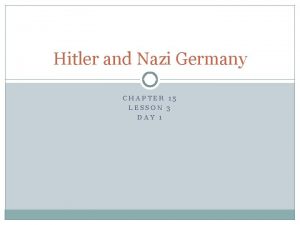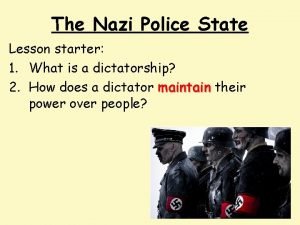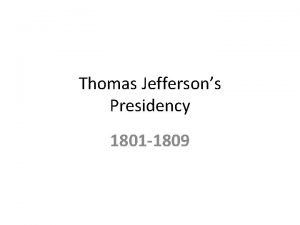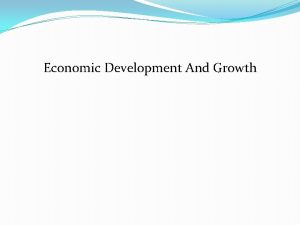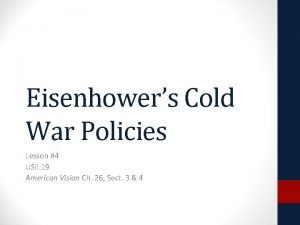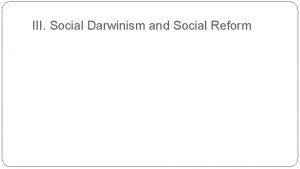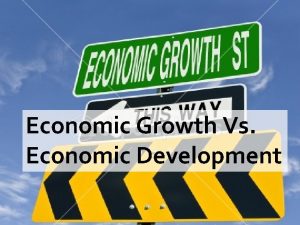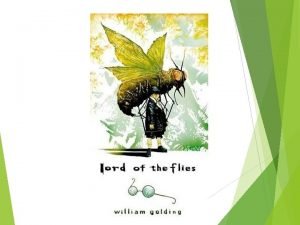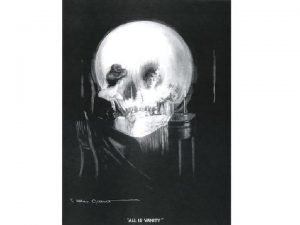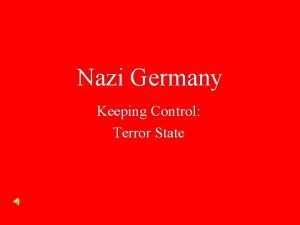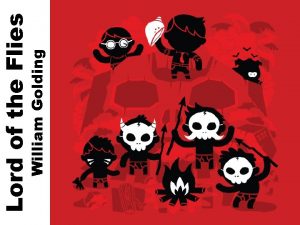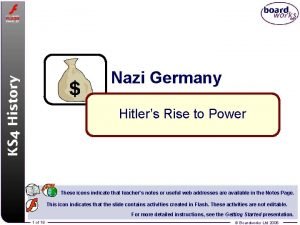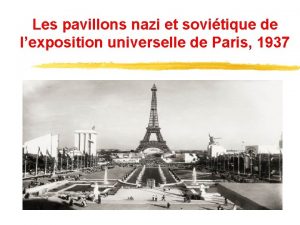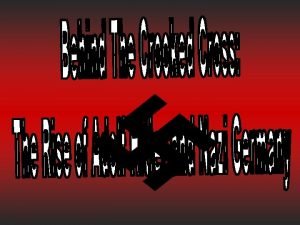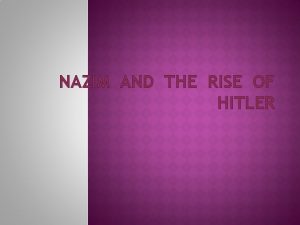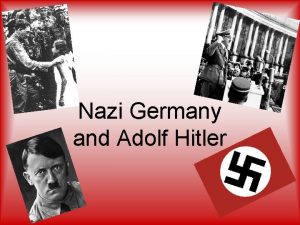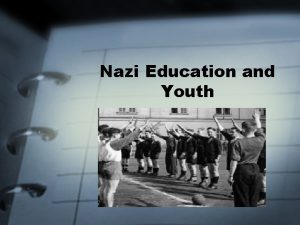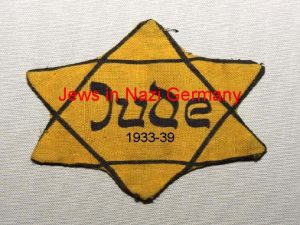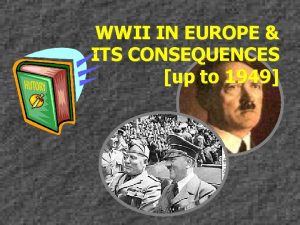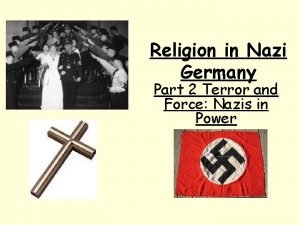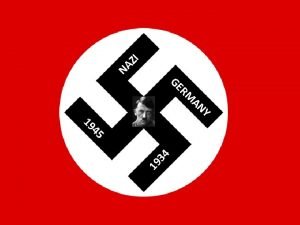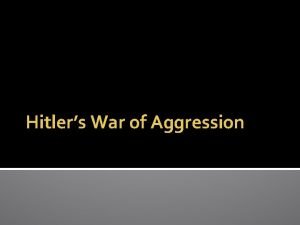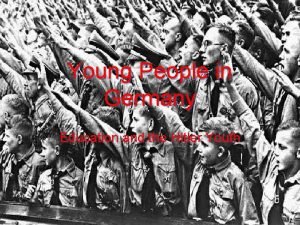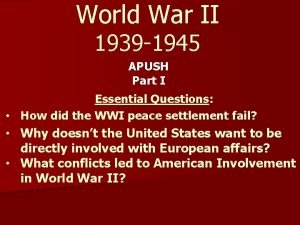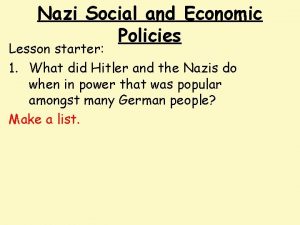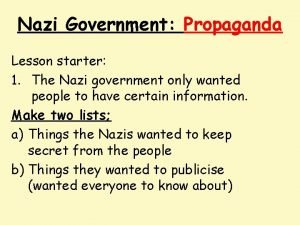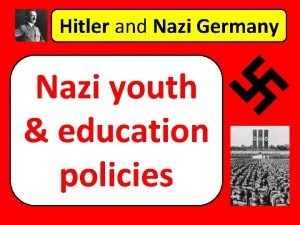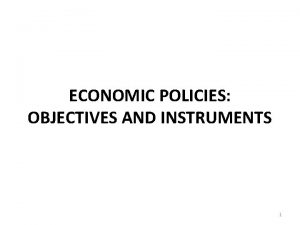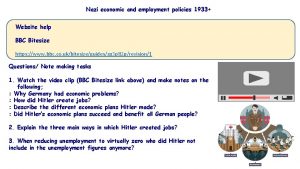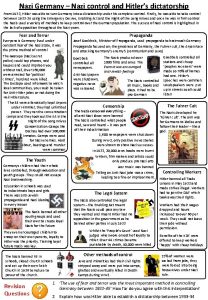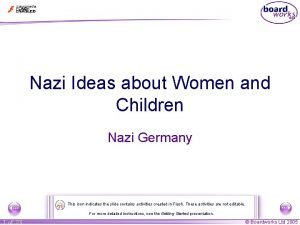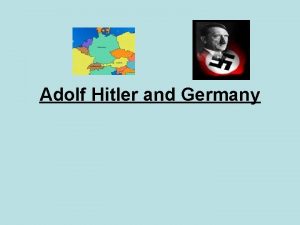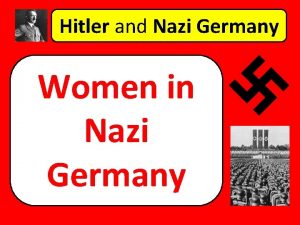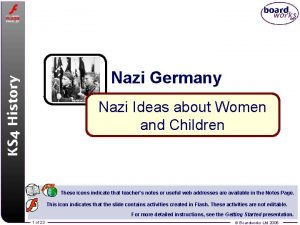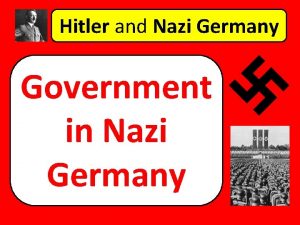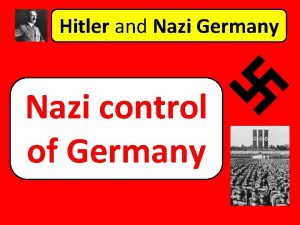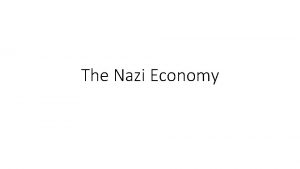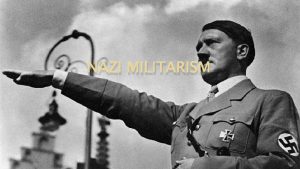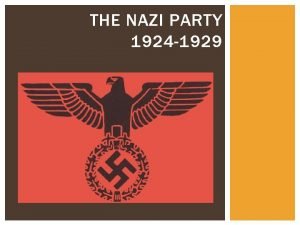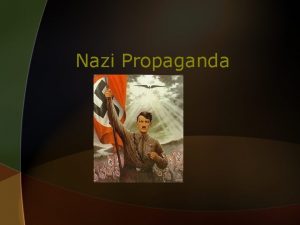Nazi Social and Economic Policies Lesson starter 1












































- Slides: 44

Nazi Social and Economic Policies Lesson starter: 1. What did Hitler and the Nazis do when in power that was popular amongst many German people? Make a list.


What did the Nazis do that made Germans happy? • Held huge national events like the Berlin Olympics 1936 made Germans proud • Gave everybody a job and wage • A huge public works programme – building houses, hospitals and schools • Created the autobahn (motorway) creating 80, 000 jobs • Rearmed Germany – built up the army, built tanks, aeroplanes (Luftwaffe) etc

Today we will… • Identify the ways that the Nazis helped the Germany economy • Describe the ways that the Nazis rewarded German people

I can… • Make a decision about whether I would support or oppose the Nazis • Justify my decision using evidence

Try to come up with a definition of the two terms Economic policies Social Policies

Economic policies – those which affect the economy eg. Jobs and borrowing money Social Policies - those which affect the standard of living of the people

Economy

The German Labour Front (DAF) • This organisation controlled all work in Germany and put men into work (compulsory) • Workers had a wage and job security • They had long hours but regular breaks • But, Trade Unions were banned • In 1933 there were over 6 million unemployed • By 1939 unemployment was 0% • Many Germans were thankful for wages and job security after the Weimar years

German men in the DAF off to build the autobahn Propaganda publicised Hitler’s successes, like putting men into jobs >>

Social

What did the Nazis do that made Germans happy? • Before the Nazis Weimar Germany had seen lots of riots, strikes & even revolutions • The Nazis locked up all the troublemakers e. g. communists, criminals etc. • The streets were safe and there was almost no crime. • There were no more violent strikes because the trade unions were controlled.

What did the Nazis do that made Germans happy? • Youth organisations provided activities, uniforms and free trips for poorer children • Workers could now get a subsidised holiday cruises or tickets to concerts or football matches.

KDF: Strength Through Joy • The Most popular Nazi organisation • Provided people with free leisure activities as a rewards for their hard work • Free concert tickets, day trips, holidays • By 1938, 10 million had gone on a KDF holiday • Two cruise liners built to take people on KDF holidays • It was the first time many German people had ever had such luxuries

Sports Stadiums were built Holiday complexes were built (e. g. Prora) Cruise Liners were built to take people to Maderia & Norwegian Fjords The Volkswagon (KDF Wagon / People’s Car) was subsidised by the programme)

Prora was part of a Kd. F scheme, a holiday camp at a German beach resort The Nazi Holiday Camp

The Peoples’ Car • Workers were encouraged to buy savings stamps which they would collect and exchange for a Volkswagen Beetle • Again, a car was an amazing luxury to Germans after the misery of Weimar years

Hitler’s Targets 1. Full employment 2. A happy and contented workforce

Hitler’s Ideas • German economy can be converted into a war machine – he believed Germany had lost World War One because it relied too much on foreign imported goods • Germany must rearm quickly, conquer countries and takeover their economies and move on • By exploiting conquered countries, living standards could be maintained at home despite all the money being spent on war • In 1936 Goering was appointed to introduce a 4 year plan to put Hitler’s ideas into action

Were people better off under the Nazis? • Unemployment fell everywhere not just in Germany • Some people were forced to work on public works • There were disadvantages – workers had no representation • Workers put more into the economy than they got out • If you were “Aryan” and of no strong political beliefs life was relatively good

Jobs The Nazi ‘Economic Miracle’ -When Hitler took power in 1933 unemployment stood at 6 million; almost half the total German workforce; -The Nazi propaganda machine under Goebbels led Germany and the world to believe that Hitler had accomplished an unparalleled miracle of economic recovery… Unemployment in Germany Total January 1933 6 million January 1934 3. 3 million January 1935 2. 9 million January 1936 2. 5 million January 1937 1. 8 million January 1938 1. 0 million January 1939 302, 000

Full employment |Happy/Content • Many young men made to join • Loyal German workers the army, reduced the were given bonuses such unemployment figures as subsidised cruises or • The wages were lower but concert tickets. Germans had real jobs • German workers could building roads, houses etc. save for a car, an • Many Jews sacked from unheard of luxury for government jobs – non Jews British workers. given their jobs • Many married women sacked and jobs given to men • Unemployment dropped from 6 million in 1932 to less than 1 million in 1938, the lowest in Europe.

Overview • An overview of Hitler’s Domestic Policy

Jobs The Nazi ‘Economic Miracle’ Women were not included in the statistics. So any women unemployed during Nazi rule did not exist as far as the statistics were concerned. All was not as it seemed… After the 1935 Nuremburg Laws, Jews lost their citizenship and were not included in the statistics. EVEN THOUGH many lost their jobs when Hitler came to power. The unemployed were given a simple choice – do any work the government gave to you OR be classed as workshy and put in a concentration camp

Getting unemployment figures to be so low was viewed by many as a Nazi book-keeping trick… 1935 – n i t h g u o r was b n o i t p i r off c s n n e k a Co t e r e men w g n u o y y n n they a e h m w s c i t s i nt stat e m y o l p m e army… un e h t n i e m i did their t By 1939 the army wa s 1. 4 million in size…many factorie s were built and weapons made wh ich reduced unemployment figure even more… failed e v a h t o n ld u o c Unemployment asures in e m h c u s h it w ll to fa cared s o o t e r e w le p o place…BUT pe to speak out… BUT THERE CAN BE NO DOUBT THAT JOBS WERE CREATED…!!!

Economy • Hitler banned all Trade Unions on 2 May 1933. • Their offices were closed, their money confiscated, and their leaders put in prison. Robert Ley, PROFILE -WWI Pilot who spent 2 years as a prisoner of war after being shot down in France; -Chemist after WWI but sacked because of a serious drink problem; -Joined the NSDAP in 1925; -1933 was given the task of forming the GERMAN LABOUR FRONT which replaced the outlawed Trade Unions; -He confiscated union funds to pay for the “Strength Through Joy” programme; -Charged with war crimes he hanged himself in his cell 25 th October 1945.

-Set up to ‘protect’ those in work; -Contracts drawn up under the Weimar Republic were ripped up and rewritten; -Employers could demand more of their workers… -…but workers enjoyed increased security at work and benefits; -Membership was voluntary in theory, but anyone not a member would struggle to find a job without being a member. Arbeitsfront (German Labour Front) Flag • In a bid for full employment government spending rose, 1932– 38 from about 5 billion to 30 billion marks.

• The GLF increased the number of hours worked from 60 to 72 per week (including overtime) by 1939. • Strikes were outlawed. • The average factory worker was earning 10 times more than those on dole money and few complained… • …though, as always, to do would put you at risk.


Which is the Odd One Out and why?

Autarky …to be self-sufficient - In WWI Germany was crippled by the British Naval Blockade; -Hitler was determined that this would not happen again… Autarky means economic self sufficiency. This means that a country produces enough goods of its own so that it doesn’t have to import goods (especially raw materials – coal, oil, iron ore) from other countries. Hitler wanted to achieve autarky so that if war came Germany would not be dependent on imports.

Hjalmar Schacht • President of the Reichsbank - directed German economic policy • Believed in steady growth and a stable currency • Against spending out too much on rearmament before the German economy was strong enough • His New Plan of 1934 aimed to reduce imports into Germany and to strengthen the currency – it did not work! Imports went up! • He fell out with Hitler over the speed of rearmament and was replaced by Hermann Goering in 1936

Goering’s 4 Year Plan • Speed up rearmament and make Germany ready for war • German Military spending 1933 1939 1. 9 million marks 32. 3 million marks • Make Germany self sufficient in raw materials “autarchy” by developing home grown substitutes*.

• The New Plan of 1934 stopped imports and subsidised industry; • Production rose, especially of oil, steel, coal and explosives. • In 1936, Goering was put in charge. His Four Year Plan proposed to get the army and industry ready for war in four years. • Employers were happy when workers were well disciplined. • BUT businesses were strictly controlled; they could be told to make something different/ were not allowed to raise wages/ workers could be sent to other factories. • Goering said: ‘Iron makes an empire strong; butter only makes people fat’.

What were the results of this? • The size of the German army grew massively • Hitler became more confident and started to openly break the Treaty of Versailles. • This eventually led to war!

Was the 4 Year Plan a success? • Unemployment dropped quickly 4. 8 million in 1933 to 0. 5 million in 1938 • Wages rose slightly but were still lower in 1938 than they had been in 1928 • Working hours went up to 49 hours per week in 1939 – 52 hours in 1943 to over 60 hours per week by 1945 • There were fewer consumer goods - personal and household goods • Trade unions were replaced by “Beauty of Labour” and “Strength Through Joy” who organised better conditions and leisure activities

Jobs / Economy For ordinary people, life was good: • full employment (work programmes/ Strength through Joy) gave prosperity and financial security - many observers stated that there seemed to be no poverty in Germany • law and order (few people locked their doors), • autobahns improved transport, • frequent ceremonies, rallies, colour and excitement, • Nazi propaganda gave people hope, • Nazi racial philosophy gave people self-belief • Trust in Adolf Hitler gave a sense of security (one German woman told the American reporter Nora Wall: 'He is my mother and my father. He keeps me safe from all harm).

There were a few drawbacks: Wages fell, and strikers could be shot - the Nazis worked closely with the businessmen to make sure that the workforce were as controlled as possible. Loss of personal freedoms (e. g. freedom of speech). All culture had to be German – e. g. music had to be Beethoven or Wagner or German folk songs - or Nazi – e. g. all actors had to be members of the Nazi party/ only books by approved authors could be read.

http: //www. bbc. co. uk/learningzone/clips/org anised-opposition-to-the-nazis/3285. html

Activity We are going to follow through the story of the economy of Nazi Germany through the eyes of four very different characters. You need to fill in your sheet as we go, giving each characters experience a rating with a red, green or amber mark in the corner (or ‘R’ ‘A’ ‘G’). You will have to INFER details with each section. Remember, I am looking for quality! THINK! – Be clear with your explanation of why each character is affected positively or negatively. C/D: To explain how the Nazis affected different sections of society in Germany A/B: Evaluate how effective Nazi employment policies were

A Jewish businessman called Frederick Steiner. He owns one of the biggest department stores in Berlin and considers himself to be German. An unemployed white male called Franz Keller. He lives in a small village called Sandsbach, in Bavaria, not far from a big city. A middle class woman called Eva Elgar. She has a job in a factory for a small car manufacturing company in Berlin, as a manager. A wealthy industrialist from an upper class family called Ludwig Von Schirach. He owns a large tractor factory in Stuttgart. He knows some senior Nazis.

January 1934 January 1936 January 1938 January 1940 June 1945 January 1935 Extension: Pick one character. well they done during Remember, I am How looking for have quality! C/D: To explain how the Nazis affected the Nazi THINK! – Be clear with yourdictatorship? Explain different sections of society in Germany explanation of why character is in each detail. A/B: Evaluate how effective Nazi affected positively or negatively. employment policies were

Task One Using everything you have learned in this unit, create a list of; Positives of Life under the Nazis Negatives of Life under the Nazis

Decision Making Exercise Name: I would choose to (pick one): • Keep quiet and go along with the Nazis • Stand up to the Nazi government Reasons to support my decision (6 marks): Reasons for rejecting the other decision (4 marks):
 Lesson 3 hitler and nazi germany
Lesson 3 hitler and nazi germany Chapter 1 lesson 2 our economic choices worksheet answers
Chapter 1 lesson 2 our economic choices worksheet answers Nazi police state lesson
Nazi police state lesson Manuel roxas policies
Manuel roxas policies Thomas jeffersons presidency
Thomas jeffersons presidency Lesson starter
Lesson starter Conclusion of growth and development
Conclusion of growth and development Lesson 4 eisenhowers cold war policies
Lesson 4 eisenhowers cold war policies What was reform darwinism?
What was reform darwinism? Economic growth vs economic development
Economic growth vs economic development Vivienne westwood destroy nazi
Vivienne westwood destroy nazi William golding nazi
William golding nazi William golding interesting facts
William golding interesting facts Hitler rise to power
Hitler rise to power Nazi club spongebob
Nazi club spongebob Black guerilla family tattoos
Black guerilla family tattoos Hitler terror quotes
Hitler terror quotes William golding nazi
William golding nazi Schutzstaffel
Schutzstaffel William golding nazi
William golding nazi Imagen de nazi
Imagen de nazi Le pavillon nazi
Le pavillon nazi Henry madden nazi
Henry madden nazi Adolf hitler was born
Adolf hitler was born The nazi police state
The nazi police state What is this image
What is this image Nazi fuck
Nazi fuck Nazi fuck
Nazi fuck V3million
V3million Nazi
Nazi Nazi
Nazi 8 stages of the cambodian genocide
8 stages of the cambodian genocide Nazi
Nazi Who are the allied powers
Who are the allied powers Jeopardy bizmark
Jeopardy bizmark Religion
Religion Nazi
Nazi Map of germany and poland
Map of germany and poland Kenyan desserts
Kenyan desserts Gestapo flag
Gestapo flag Holocaust acrostic poem examples
Holocaust acrostic poem examples Nazi aggression map
Nazi aggression map Hyper log
Hyper log Jungmadelbund
Jungmadelbund Nazi party apush
Nazi party apush
